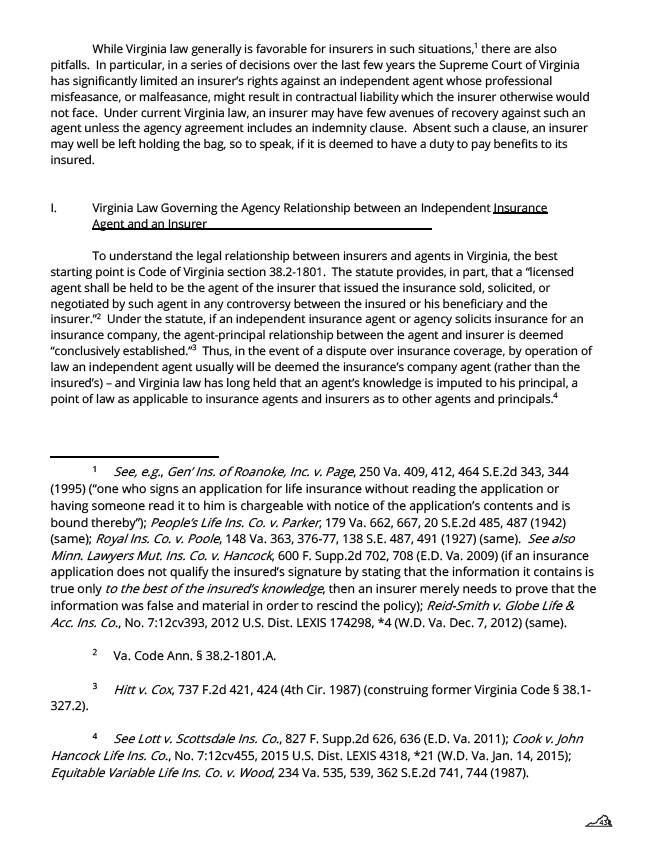
While Virginia law generally is favorable for insurers in such situations,1 there are also
pitfalls. In particular, in a series of decisions over the last few years the Supreme Court of Virginia
has significantly limited an insurer’s rights against an independent agent whose professional
misfeasance, or malfeasance, might result in contractual liability which the insurer otherwise would
not face. Under current Virginia law, an insurer may have few avenues of recovery against such an
agent unless the agency agreement includes an indemnity clause. Absent such a clause, an insurer
may well be left holding the bag, so to speak, if it is deemed to have a duty to pay benefits to its
insured.
I. Virginia Law Governing the Agency Relationship between an Independent Insurance
43 - 2 -
Agent and an Insurer
To understand the legal relationship between insurers and agents in Virginia, the best
starting point is Code of Virginia section 38.2-1801. The statute provides, in part, that a “licensed
agent shall be held to be the agent of the insurer that issued the insurance sold, solicited, or
negotiated by such agent in any controversy between the insured or his beneficiary and the
insurer.”2 Under the statute, if an independent insurance agent or agency solicits insurance for an
insurance company, the agent-principal relationship between the agent and insurer is deemed
“conclusively established.”3 Thus, in the event of a dispute over insurance coverage, by operation of
law an independent agent usually will be deemed the insurance’s company agent (rather than the
insured’s) – and Virginia law has long held that an agent’s knowledge is imputed to his principal, a
point of law as applicable to insurance agents and insurers as to other agents and principals.4
1 See, e.g., Gen’ Ins. of Roanoke, Inc. v. Page, 250 Va. 409, 412, 464 S.E.2d 343, 344
(1995) (“one who signs an application for life insurance without reading the application or
having someone read it to him is chargeable with notice of the application’s contents and is
bound thereby”); People’s Life Ins. Co. v. Parker, 179 Va. 662, 667, 20 S.E.2d 485, 487 (1942)
(same); Royal Ins. Co. v. Poole, 148 Va. 363, 376-77, 138 S.E. 487, 491 (1927) (same). See also
Minn. Lawyers Mut. Ins. Co. v. Hancock, 600 F. Supp.2d 702, 708 (E.D. Va. 2009) (if an insurance
application does not qualify the insured’s signature by stating that the information it contains is
true only to the best of the insured’s knowledge, then an insurer merely needs to prove that the
information was false and material in order to rescind the policy); Reid-Smith v. Globe Life &
Acc. Ins. Co., No. 7:12cv393, 2012 U.S. Dist. LEXIS 174298, *4 (W.D. Va. Dec. 7, 2012) (same).
2 Va. Code Ann. § 38.2-1801.A.
3 Hitt v. Cox, 737 F.2d 421, 424 (4th Cir. 1987) (construing former Virginia Code § 38.1-
327.2).
4 See Lott v. Scottsdale Ins. Co., 827 F. Supp.2d 626, 636 (E.D. Va. 2011); Cook v. John
Hancock Life Ins. Co., No. 7:12cv455, 2015 U.S. Dist. LEXIS 4318, *21 (W.D. Va. Jan. 14, 2015);
Equitable Variable Life Ins. Co. v. Wood, 234 Va. 535, 539, 362 S.E.2d 741, 744 (1987).